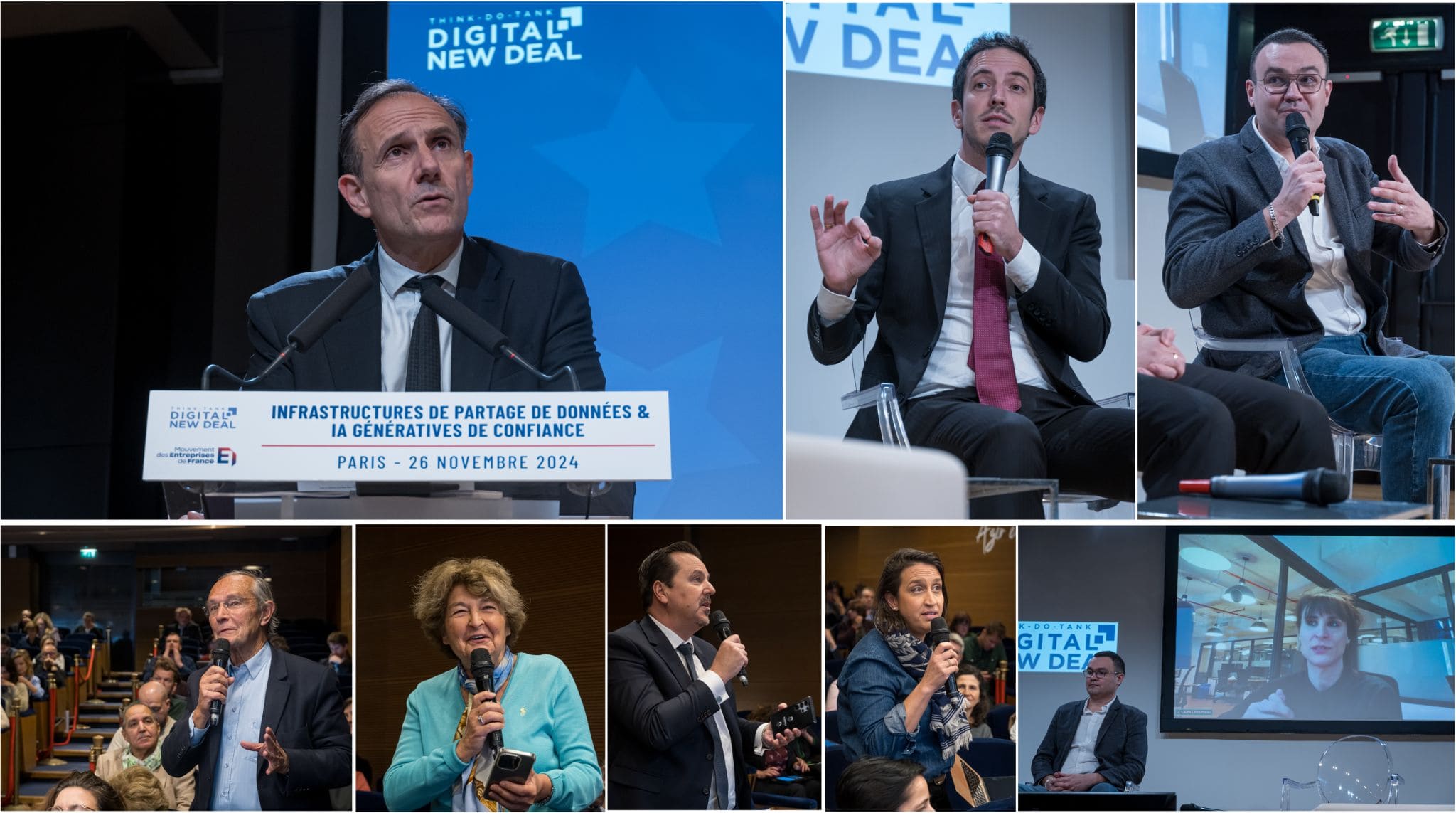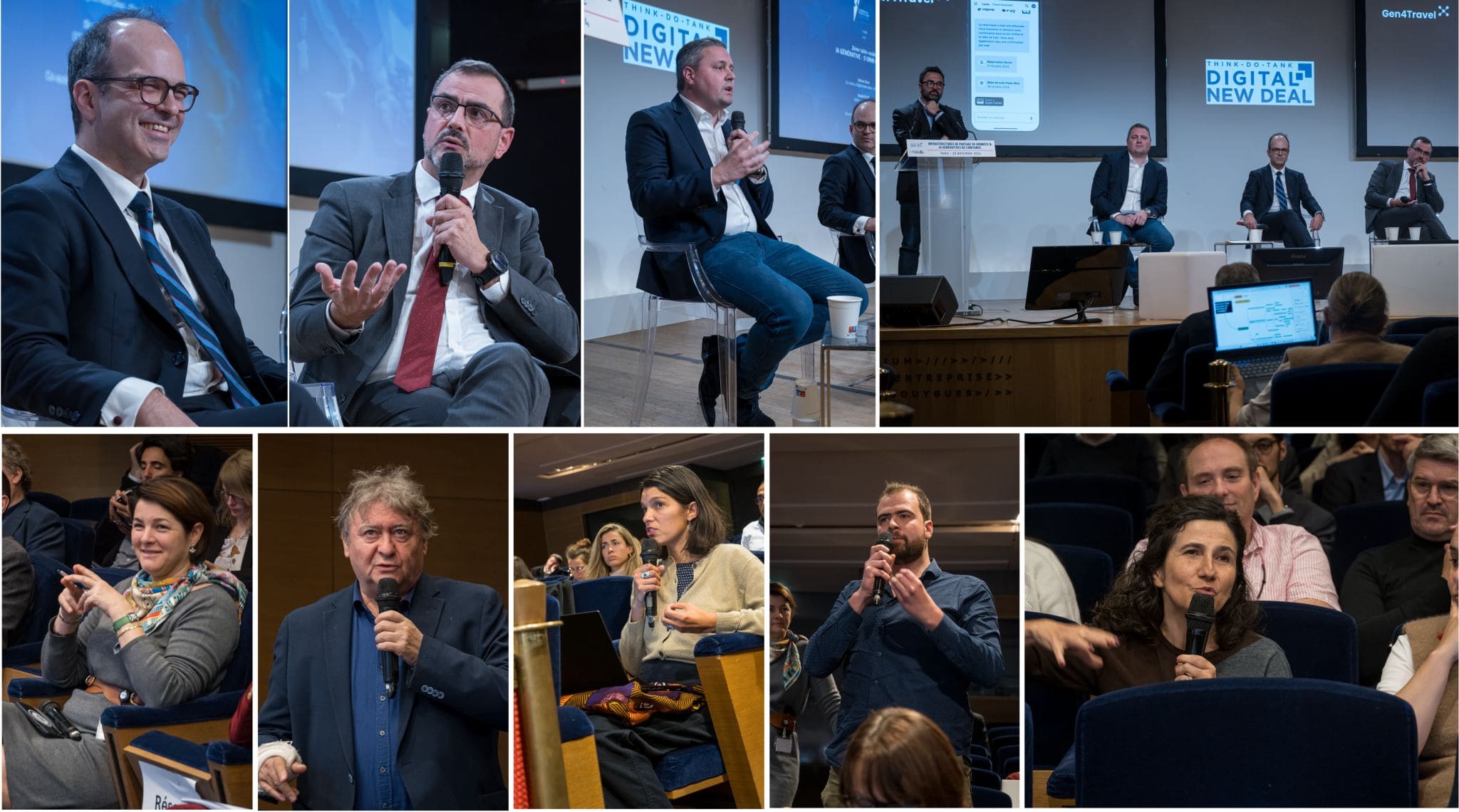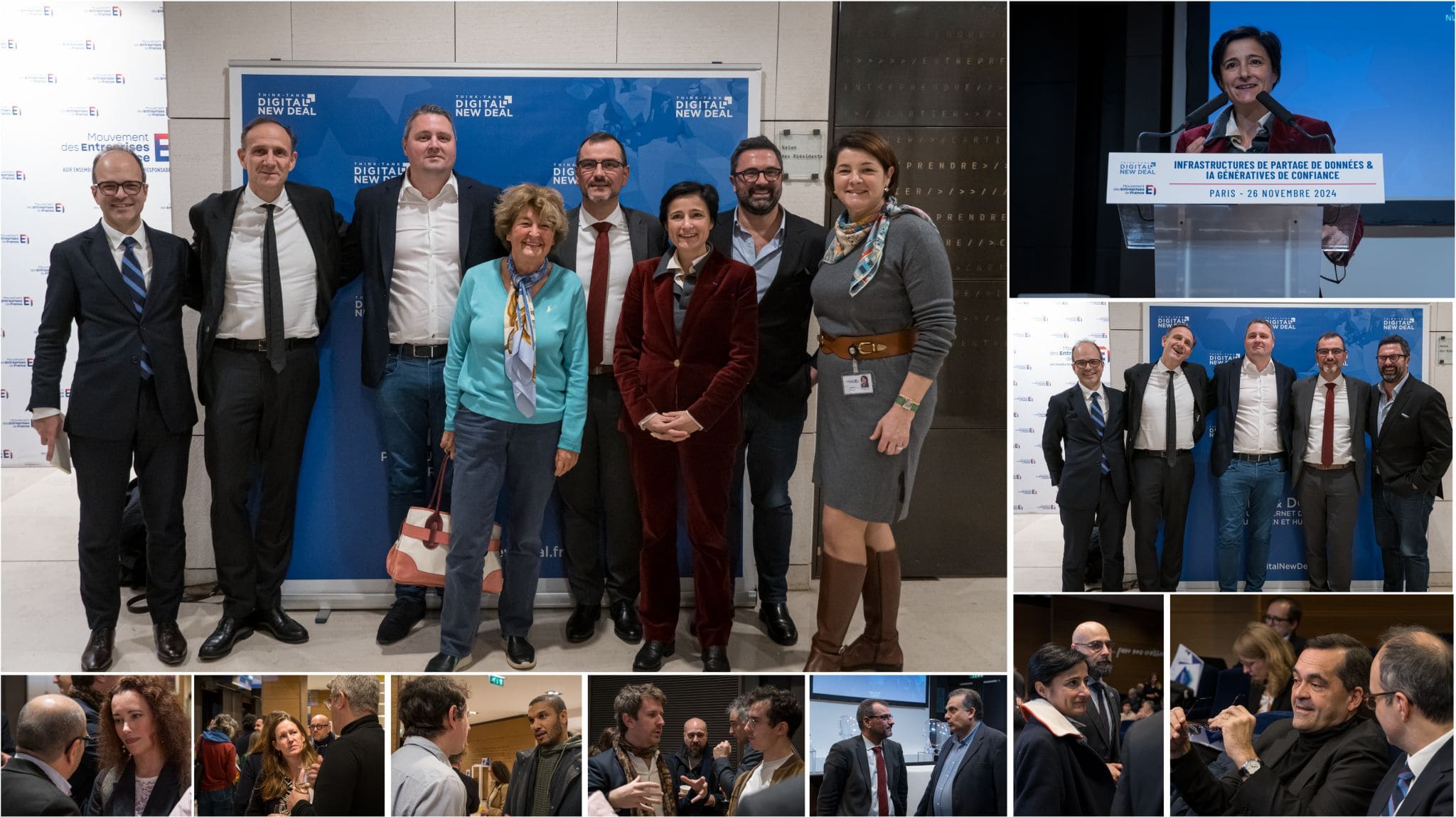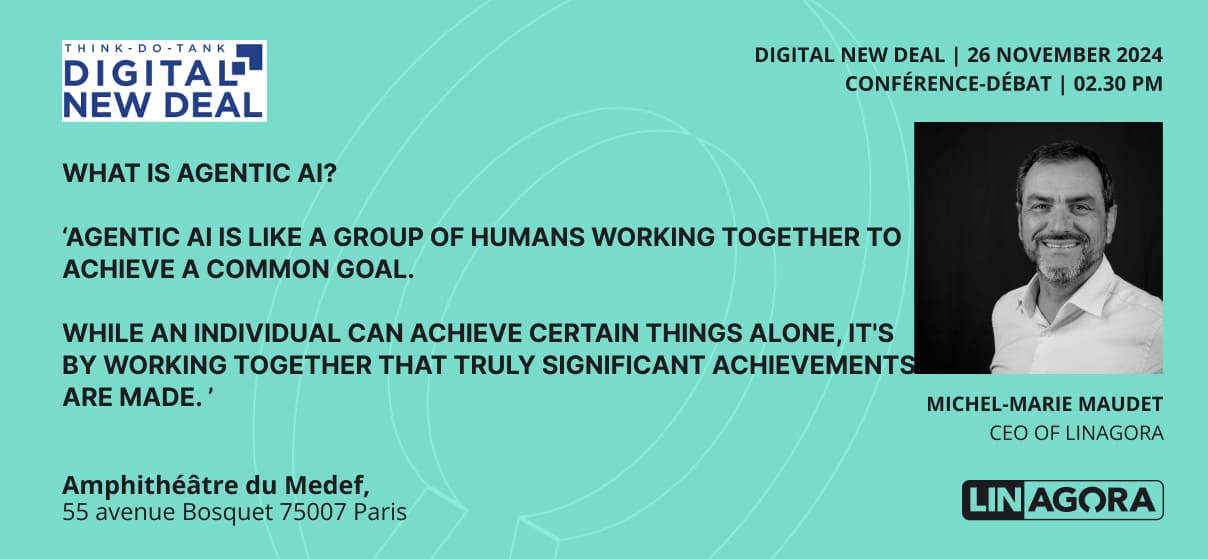A few days ago, our two founders, Alexandre Zapolsky and Michel-Marie Maudet, visited the MEDEF (Mouvement des Entreprises de France) offices for an afternoon of innovative conferences organised by the Digital New Deal foundation.
Nearly 150 people gathered in the MEDEF amphitheatre for the first round-table discussion on ‘Plaidoyer pour les grandes oubliées: les infrastructures publiques de partage de données’, co-authored by Laura Létourneau, expert advisor for ecological and digital transformations at the Prime Minister's Office, Raphaël Beaufret, Director of Digital Services at AP-HP, and Sébastien PICARDAT, Managing Director & CEO Agdatahub. Published by Digital New Deal Foundation and Terra Nova.
This was followed by a second round-table discussion on the report ‘AI générative: s'unir ou subir’, co-authored by Arno Pons, General Delegate Think-Tank at the Digital New Deal Foundation, Olivier Dion, Senior technical advisor & published author for the Digital New Deal Foundation, and Michel-Marie Maudet, Managing Director of LINAGORA.
A session led by the 3 co-authors of this report, accompanied by David Krieff, President of Eona-X's Data Space Mobility and Tourism.
It was a fascinating discussion, introduced by Olivier Sichel, Chairman of the Digital New Deal Foundation and DGA of Caisse des Dépôts, and closed by Virginie Fauvel, Co-Chair of the MEDEF's Digital and Innovation Commission.
The new horizons of AI: an introduction to agentification
This report is the result of collaboration around two main themes: the digital commons via Open Source, and agentification. In France, the issue of agentification is emerging as a central pillar of discussions around artificial intelligence, particularly in their practical application to organisational data.
Reminder: building trusted AI
As a reminder, we are convinced that technological mastery is crucial to guaranteeing trusted AI. In contrast to the dominance of BigTechs, national initiatives such as the France 2030 project offer a credible alternative to the digital world. The LUCIE model, developed as part of the OpenLLM France initiative, is an eloquent example. This LLM, designed and trained in France, represents a major step forward in terms of digital sovereignty and reliability for France and Europe.
Faced with growing dependence on solutions from the giants, France has mobilised around sovereign projects such as LUCIE, designed from scratch and embodying the local capacity to develop effective, controlled tools. These initiatives reflect a clear ambition:
" Developing technologies over which we have greater control. Indeed, it's not just BigTechs, it's not just AI by OpenAI ..."
‘The second point is: how do we anchor these models in relation to the most ‘no-golden source’ data?’ explains Michel-Marie. Indeed, trusted AI also relies on the use of reliable data. Anchoring AI models in each organisation's own data, the so-called ‘golden sources’, is fundamental. This mitigates the risks associated with the hallucinations of large language models and guarantees their applicability to critical or transactional systems.
Agentification: towards AI that can be used with company data
For these foundation models to become truly operational in organisations, we need to rely on intelligent agents. These agents play a key role in :
- Connect models to the most recent business data, ensuring that answers are relevant and fresh.
- Promoting data interoperability and reformulation, simplifying the integration of complex systems.
- Streamline the user experience, by eliminating the friction associated with navigating between different systems and applications.
According to Michel-Marie, this involves
" connect the model to the most up-to-date data available in the organisation's information systems."
Agentic AI: the new generation of AI
Agentication, or agentic AI, opens up new possibilities for interaction. These agents not only simplify complex processes, but also redefine the way we interact with technology.
This vision, underpinned by greater control over data and models, strengthens confidence in AI while offering a fluid and optimised user experience. This path, which we are taking together in a collaborative manner, marks a decisive step in the development of AI that is resolutely human, collaborative and rooted in the realities of organisations.
This concept is based on the ability of autonomous agents to carry out tasks, cooperate and even make decisions semi-automatically or automatically. But beyond the theoretical definitions, what does it mean in concrete terms?
What is Agentic AI?
Michel-Marie Maudet defines Agentic AI as :
« Agentic AI is like a group of humans working together to achieve a common goal. While an individual can achieve certain things alone, it's by working together that truly significant achievements are made.
In the same way, a single model can produce answers, but it remains limited by its initial training. Agentic AI takes this idea a step further: it involves getting several AI models or agents to work together, each with its own specific skills, to learn, share knowledge and solve complex problems together. »
Agentic AI can be seen as a revolution (or evolution) of traditional AI systems. Its distinguishing feature is the use of agents capable of orchestrating complex tasks. These agents are not limited to a simple action-reaction logic, but incorporate structured thinking skills, as demonstrated by the methodology of thought chains or trees. These approaches allow complex tasks to be broken down into simpler sub-tasks, with an iterative learning model that progresses towards an optimal solution.
These agents,’ explains Michel-Marie, ’are capable of :
" retrieve information from one operator and transmit it to another, for example, without asking what the input or output format is "
Application in information systems
One of the main areas of application for AgenticAI is information systems. Data spaces, which are often fragmented between different silos, are a good illustration of this challenge. Traditionally, scripts had to be written to transcribe data from system A to system B. Today, agents can handle this orchestration autonomously, considerably simplifying processes.
For example, an agent can query a database belonging to an operator such as Amadeus, process the information and then transmit it to another system without human intervention. These capabilities not only make transactions smoother, they also enable data to be updated in real time and make it more interoperable.
The report calls for a collective mobilisation around the digital commons, relying on Open Source to maximise the impact of investments. This approach aims to guarantee interoperability between sectors and strengthen technological autonomy. As Michel-Marie :
" What we need to do is implement autonomous agents in organisations [...] to be able to make this data actionable. ".
The latest advances in Agentic AI
In recent months, several milestones have been reached in the development of AgenticIA. For example, Microsoft has published work positioning this technology as the founder of General Artificial Intelligence (GAI). This vision is inspired by human functioning: just as a rugby team combines the strengths of its players to achieve a common goal, autonomous AI systems coordinate their efforts to solve complex problems.
Recent projects, such as OpenAI's Swarm, show how AgenticAI can transform usage. A particularly striking example is bolt.new, an AI capable of generating complete applications in just a few prompts. Behind these feats are agents that take charge of creating the front-end, back-end and their integration, making development accessible to non-developers.
Another concrete example of this approach, tested live at the conference, is the Gen4Travel project, which aims to optimise complex transactions in the travel sector using generative AI anchored in accurate, up-to-date data.
The benefits of AgenticIA are not limited to one sector or field. The architectures developed, particularly in projects such as GenforTravel, are generic and replicable. They are based on three essential pillars:
- Data, with enhanced interoperability.
- Language, to move from purely informative models to action models.
- Actions, made possible by autonomous agents capable of executing complex processes.
This regulatory framework is based on a long-term strategic vision. It also calls for a united effort to develop these agents as digital commons.
" These agents [...] can themselves become common links, digital commons that can be exchanged from one channel to another. "
AgenticIA is more than a technological breakthrough; it represents a revolution in the way we approach autonomy and cooperation in intelligent systems. Current initiatives show that it is possible to overcome technological obstacles and offer frugal, agile and reliable solutions. To do this, we need to adopt a proactive and collaborative approach, and above all, believe that ‘it can be done’!



crédits photos: Digital New Deal - MEDEF


